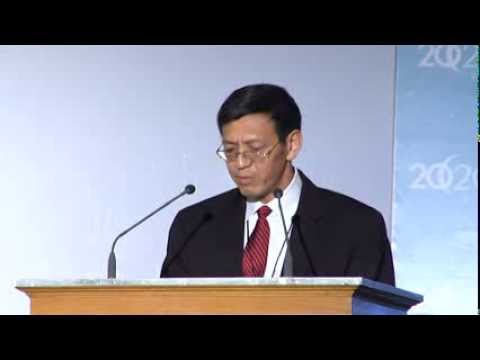“If the past is any guide, we will face a barrage of shocks, both natural and man‐made, in the coming years. In just the past five years, we have seen a major earthquake in Haiti; drought in the Horn of Africa; earthquake, tsunami, and nuclear crisis in Japan; and conflicts that have left millions of people homeless, maimed, or dead. And let us not forget the food price spikes of 2008 that have made the global food system more volatile since then… The IPCC recently published a new report confirming that humans are causing climate change and warning of further shocks to come.”
Shenggen Fan, Director General at IFPRI, began his introductory remarks by outlining some of the major challenges that threaten the food and nutrition security of the world’s poor and most vulnerable people. He and the other distinguished keynote speakers from the inaugural session then went on to share their reflections on what building resilience looks like within the context of agricultural development. Rather than merely helping people “bounce back” from the negative impacts of shocks, building resilience, they agreed, involved a more transformative process in which individuals, households, and communities become better-off than before the shocks occurred.
Defining resilience, of course, is just the starting point. Helping people become better off and more resilient to future shocks is the aim of myriad development efforts seeking to implement a resilience framework. To find such an example of people bouncing back stronger, several speakers pointed to the case of Ethiopia, which is subject to frequent drought, the most recent occurring in 2011. Though many worried about the possibility of another famine similar to the one that took place thirty years ago, such conditions never materialized.
What changed from the 1980s? Fan pointed to the country’s Productive Safety Net Programme (PSNP) and Risk Financing Mechanism as playing key roles in mitigating the most recent food security crisis. While the former initiative aims to better target benefits to most vulnerable people and provide them with predictable sources of income, the latter program’s flexibility allowed food assistance to be quickly scaled up and major food shortages were largely averted. Erastus Mwencha, Deputy Chairperson of the African Union Commission, observed that Ethiopia had “risen from the ashes” to become one of the most resilient and food secure nations in Africa. H.E. Hailemariam Dessalegn, Prime Minister of Ethiopia, underscored the government’s 15 percent allocation of its budget to agricultural development and food security− the highest percentage of any African nation− as a key component of the country’s resilience-building efforts.
Yet we must be careful not to attribute development successes to outside experts or processes. David Nabarro, United Nations Secretary-General Special Representative on Food Security and Nutrition, delivered his opening remarks via a video message, emphasizing that resilience is something that comes from within rather than without. If our resilience building efforts are to be successful, he argues, they must enable and empower people, societies, and institutions to strengthen their own livelihood systems and make them more resilient to shocks. Kanayo Nwanze, President of the International Fund for Agricultural Development (IFAD), drove this point home in stating that “development is not something that we do for people. Development is what people do for themselves. It must start and end from within. Our job is to facilitate the process.”
Speaker videos and summary notes
- Rajul Pandya-Lorch, Head of the 2020 Vision Initiative and Chief of Staff, International Food Policy Research Institute (IFPRI), USA
Text Remarks | Video - Shenggen Fan, Director General, International Food Policy Research Institute (IFPRI), USA
Text Remarks | Video - H.E. Hailemariam Dessalegn, Prime Minister of Ethiopia
Text Remark | Video - Kanayo Nwanze, President, International Fund for Agricultural Development (IFAD), Italy
Text Remarks | Video - Ertharin Cousin, Executive Director, United Nations World Food Programme (WFP), Italy
Text Remarks | Video - Fawzi Al-Sultan, Chair, Board of Trustees, International Food Policy Research Institute (IFPRI), Kuwait
Text Remarks | Video - H.E. John Kufuor, Former President, Republic of Ghana, (video message)
Video - Ban Ki-moon, Secretary-General, United Nations, USA (video message)
Text Remarks | Video - David Nabarro, United Nations Secretary General Special Representative on Food Security and Nutrition, Switzerland, (video message)
Text Remarks | Video - Rajiv Shah, Administrator, United States Agency for International Development (USAID), USA (video message)
Text Remarks | Video







